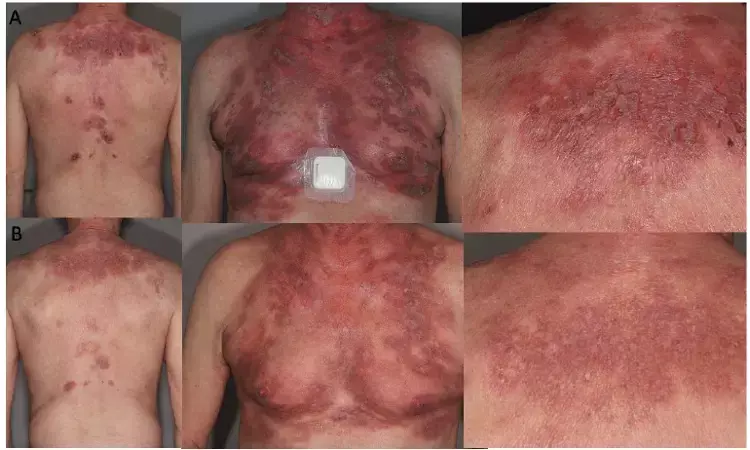- Home
- Medical news & Guidelines
- Anesthesiology
- Cardiology and CTVS
- Critical Care
- Dentistry
- Dermatology
- Diabetes and Endocrinology
- ENT
- Gastroenterology
- Medicine
- Nephrology
- Neurology
- Obstretics-Gynaecology
- Oncology
- Ophthalmology
- Orthopaedics
- Pediatrics-Neonatology
- Psychiatry
- Pulmonology
- Radiology
- Surgery
- Urology
- Laboratory Medicine
- Diet
- Nursing
- Paramedical
- Physiotherapy
- Health news
- Fact Check
- Bone Health Fact Check
- Brain Health Fact Check
- Cancer Related Fact Check
- Child Care Fact Check
- Dental and oral health fact check
- Diabetes and metabolic health fact check
- Diet and Nutrition Fact Check
- Eye and ENT Care Fact Check
- Fitness fact check
- Gut health fact check
- Heart health fact check
- Kidney health fact check
- Medical education fact check
- Men's health fact check
- Respiratory fact check
- Skin and hair care fact check
- Vaccine and Immunization fact check
- Women's health fact check
- AYUSH
- State News
- Andaman and Nicobar Islands
- Andhra Pradesh
- Arunachal Pradesh
- Assam
- Bihar
- Chandigarh
- Chattisgarh
- Dadra and Nagar Haveli
- Daman and Diu
- Delhi
- Goa
- Gujarat
- Haryana
- Himachal Pradesh
- Jammu & Kashmir
- Jharkhand
- Karnataka
- Kerala
- Ladakh
- Lakshadweep
- Madhya Pradesh
- Maharashtra
- Manipur
- Meghalaya
- Mizoram
- Nagaland
- Odisha
- Puducherry
- Punjab
- Rajasthan
- Sikkim
- Tamil Nadu
- Telangana
- Tripura
- Uttar Pradesh
- Uttrakhand
- West Bengal
- Medical Education
- Industry
Treatment of atopic dermatitis with dupilumab associated with reversible and benign Lymphoid reaction

Treatment of atopic dermatitis with dupilumab associated with reversible and benign Lymphoid reaction suggests a new study published in the JAMA Dermatology.
Since the increased use of dupilumab for atopic dermatitis (AD) in daily practice, several cases have been reported on the development of cutaneous T-cell lymphomas (CTCL) and lymphoid infiltrates.
A study was conducted provide insight in the clinical and histopathologic features of patients with AD clinically suspected for cutaneous T-cell lymphomas (CTCL during dupilumab treatment.
This retrospective observational case series included adult (≥18 years) patients with AD treated with dupilumab between October 2017 and July 2022 at the University Medical Center Utrecht in the Netherlands. Relevant patient, disease, and treatment characteristics were evaluated. Skin biopsies before, during, and after treatment were collected and reassessed.
Results
In the research, Fourteen patients (54.5% male) with a median (IQR) age of 56 (36-66) years suspected for CTCL with deterioration of symptoms during dupilumab treatment were included. Of 14 patients, 3 were retrospectively diagnosed with preexistent mycosis fungoides (MF). Eleven patients with AD were eventually diagnosed with a lymphoid reaction (LR). These patients showed MF-like symptoms; however, histopathologic findings were different, and included sprinkled distribution of small hyperchromatic lymphocytes in the upper epidermal section, a dysregulated CD4:CD8 ratio, and CD30 overexpression, without loss of CD2/CD3/CD5. The median time to clinical worsening was 4.0 months (IQR, 1.4-10.0). Posttreatment biopsies showed complete clearance of the Lymphoid reaction in all patients.
This study found that dupilumab treatment can cause a reversible and benign Lymphoid reaction which mimics a cutaneous T-cell lymphomas (CTCL) though has distinctive histopathologic features.
Reference:
Boesjes CM, van der Gang LF, Bakker DS, et al. Dupilumab-Associated Lymphoid Reactions in Patients With Atopic Dermatitis. JAMA Dermatol. Published online October 18, 2023. doi:10.1001/jamadermatol.2023.3849
Keywords:
Treatment, atopic, dermatitis, dupilumab, associated, reversible, benign, Lymphoid, reaction, Boesjes CM, van der Gang LF, Bakker DS, JAMA Dermatology
Dr. Shravani Dali has completed her BDS from Pravara institute of medical sciences, loni. Following which she extensively worked in the healthcare sector for 2+ years. She has been actively involved in writing blogs in field of health and wellness. Currently she is pursuing her Masters of public health-health administration from Tata institute of social sciences. She can be contacted at editorial@medicaldialogues.in.
Dr Kamal Kant Kohli-MBBS, DTCD- a chest specialist with more than 30 years of practice and a flair for writing clinical articles, Dr Kamal Kant Kohli joined Medical Dialogues as a Chief Editor of Medical News. Besides writing articles, as an editor, he proofreads and verifies all the medical content published on Medical Dialogues including those coming from journals, studies,medical conferences,guidelines etc. Email: drkohli@medicaldialogues.in. Contact no. 011-43720751


